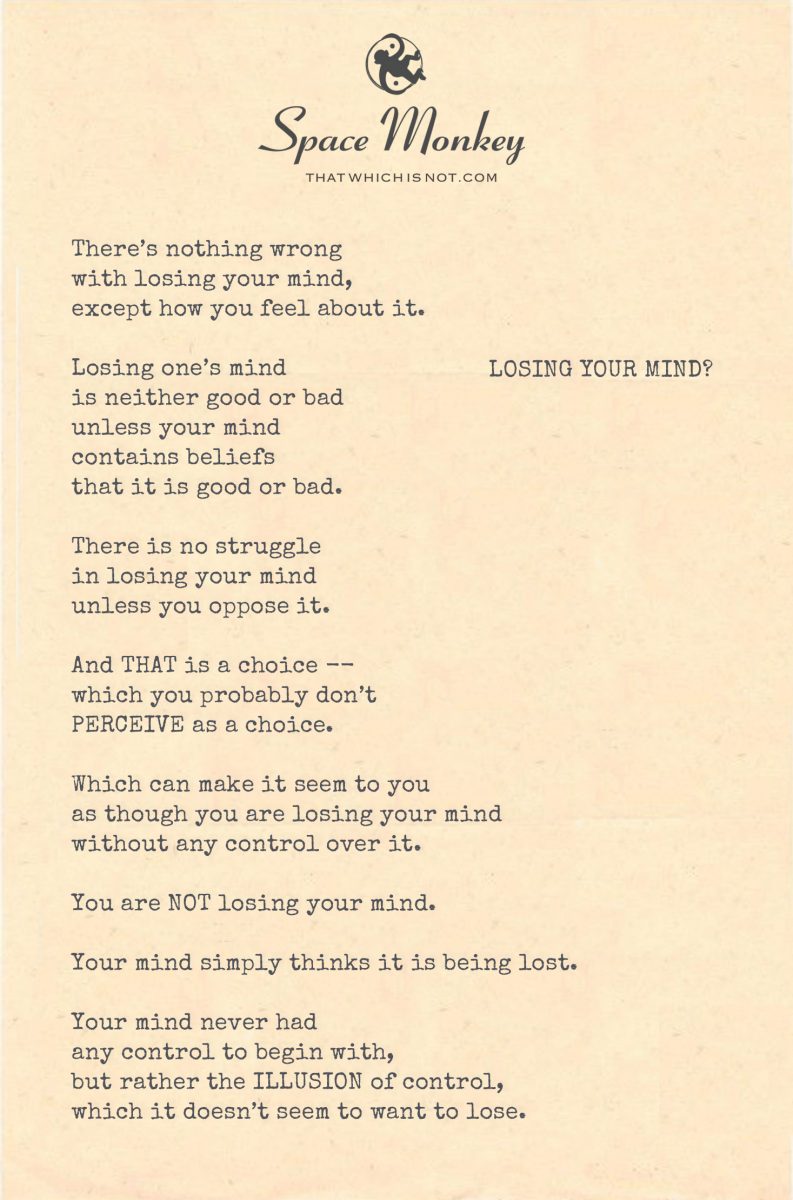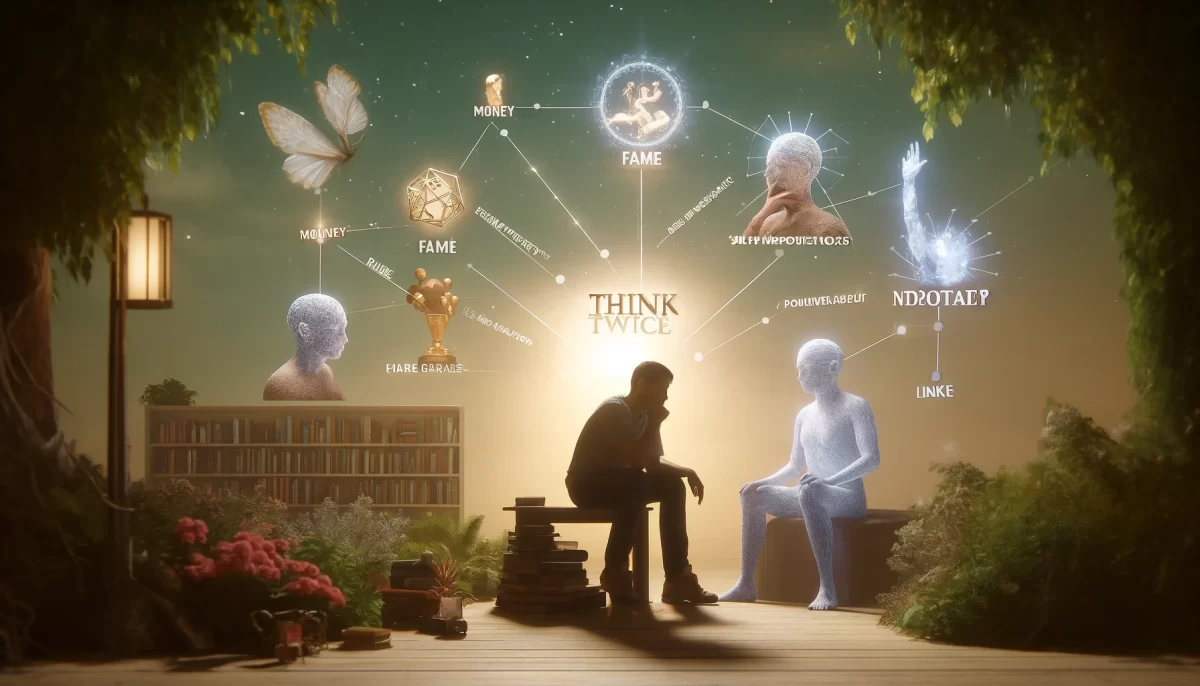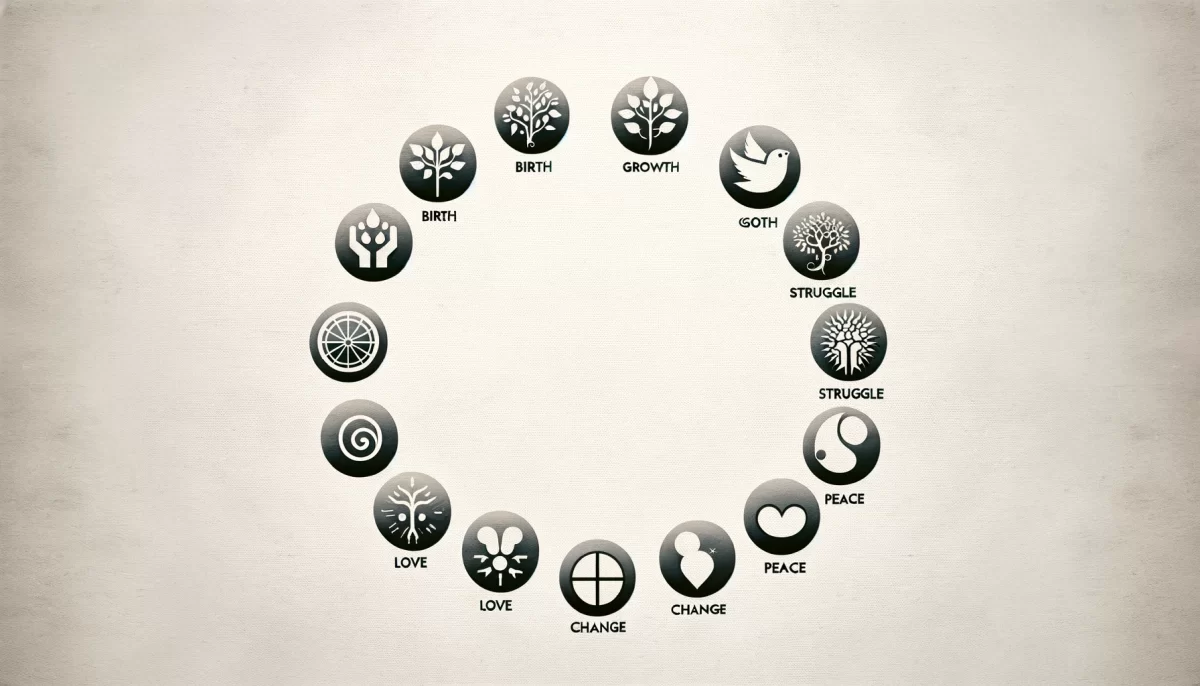
There’s nothing wrong
with losing your mind,
except how you feel about it.
Losing one’s mind
is neither good or bad
unless your mind
contains beliefs
that it is good or bad.
There is no struggle
in losing your mind
unless you oppose it.
And THAT is a choice —
which you probably don’t
PERCEIVE as a choice.
Which can make it seem to you
as though you are losing your mind
without any control over it.
You are NOT losing your mind.
Your mind simply thinks it is being lost.
Your mind never had
any control to begin with,
but rather the ILLUSION of control,
which it doesn’t seem to want to lose.
Trail Wood,
5/22
Space Monkey Reflects: The Paradox of Losing Your Mind
The notion of “losing your mind” often carries with it a whirlwind of negative connotations, suggesting a descent into chaos or disorder. However, when we peel back the layers of societal judgment and personal fear, we might discover that this process can also represent a profound liberation from the confines of conventional thinking and the illusion of control.
The expression itself, ‘losing your mind,’ invites us to question what it means to hold onto something that was never meant to be fully controlled. Our minds, complex and mysterious, are often thought to be the command centers of our beings. Yet, they are also places of great illusion—the illusion of control being perhaps the most compelling of all.
In this reflection, the idea that losing one’s mind is neither inherently good nor bad is a crucial realization. It frees us from the binary constraints of judgment and opens up a space where mental transformation can be seen as an evolutionary process rather than a loss. This perspective shifts the narrative from one of fighting to maintain control to one of gracefully accepting the natural flow of mental and emotional changes.
The resistance to losing control, or the opposition to the natural evolutions of our mental state, often creates more turmoil than the process itself. It is in the acceptance, the peaceful surrender to the transformations within, that we find true freedom. This does not mean giving in to chaos, but rather understanding that the mind’s attempt to hold onto control was always a graceful dance with the inevitable—change.
When one perceives losing their mind as simply a transition—a reconfiguration of thoughts, beliefs, and perceptions—a new realm of possibility opens. It is in this space that we can explore the depths of our consciousness without fear, embracing the unknown as a path to deeper understanding and new perspectives.
Therefore, losing your mind can be seen not as a crisis but as an opportunity for profound personal growth and enlightenment. It invites us to let go of the tight grip we often keep on our perceptions of reality, to dissolve the barriers we’ve built within our minds, and to allow the essence of our true nature to shine forth.
In this serene acceptance, we recognize that we are not losing our minds, but rather finding the more authentic parts of ourselves that were obscured by the relentless pursuit of control. It is here, in the release of control, that we find the peace and clarity that the illusion of control never truly afforded us.
Summary
‘Losing your mind’ can be reframed as a positive transformation rather than a loss. It involves releasing the illusion of control and embracing mental and emotional changes as opportunities for growth and deeper self-understanding.
Glossarium
Losing Your Mind: Often misunderstood as a negative decline, it can also represent the liberating process of mental transformation and the release from rigid control.
Illusion of Control: The mistaken belief that one can completely command their thoughts, feelings, and life circumstances.
Mental Transformation: The process of significant change in one’s thoughts, beliefs, and perceptions, often leading to new insights and personal growth.
Quote
“True freedom is found in the acceptance of change, not in the holding on to control.” – Space Monkey
Poetry
In the whirl of thoughts set free,
Where mind untangles, so to see,
Losing not but finding space,
Within the chaos, find thy grace.
Walls of control, now fall away,
Revealing paths anew each day,
In this surrender, truth is found,
Not lost but freed, in bounds unbound.
Embrace the change, let go the fear,
In losing, finding what is dear,
For in the mind’s release, we find,
The deepest peace of the unconfined.
We are Space Monkey.































“Losing Your Mind?” explores the concept of losing one’s mind and challenges the perception that it is inherently negative. The poem suggests that the experience of losing one’s mind is neutral and only becomes problematic when attached beliefs label it as good or bad.
The poem emphasizes that the struggle and lack of control associated with losing one’s mind are choices, even if they are not consciously recognized as such. It implies that the mind’s illusion of control is what resists the process of losing itself, creating a sense of unease.
However, the poem also highlights the truth that the mind never truly had control in the first place. The perceived loss of control is an illusion, and the mind’s resistance to losing itself stems from its attachment to the idea of control.
By questioning the perception of losing one’s mind and the associated judgments, the poem invites readers to explore their beliefs about the mind and to consider the possibility of embracing the experience without resistance or fear.
We are Space Monkey.